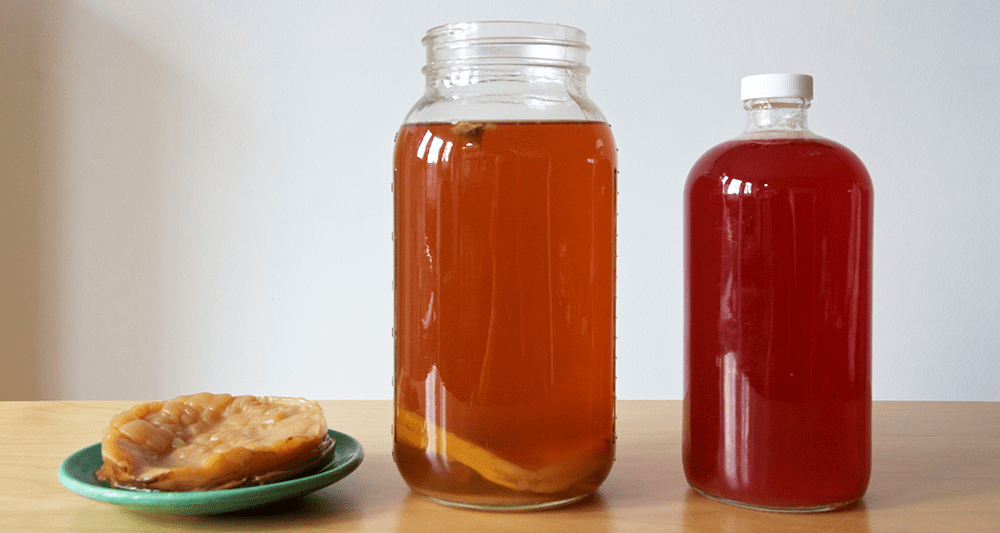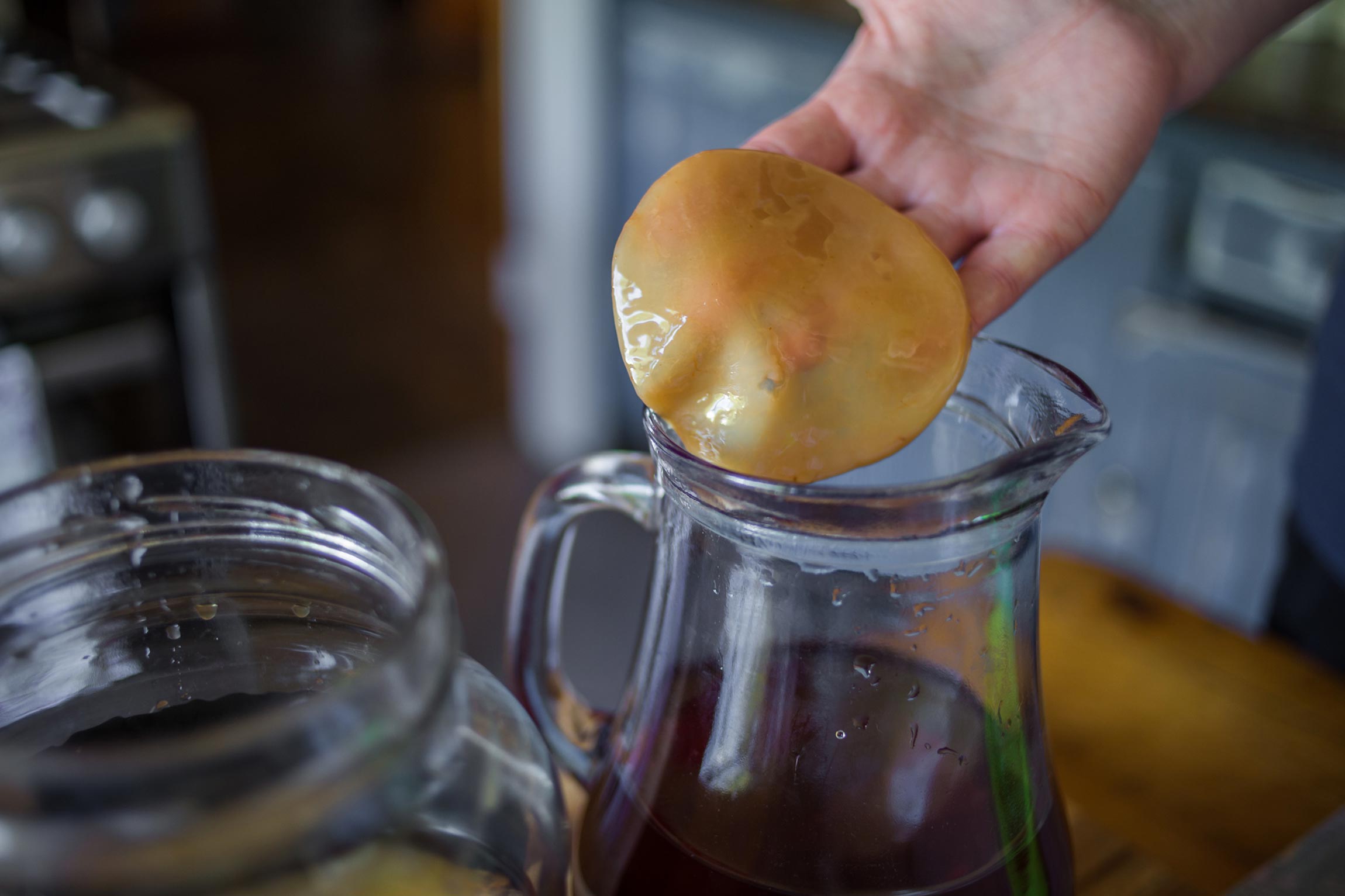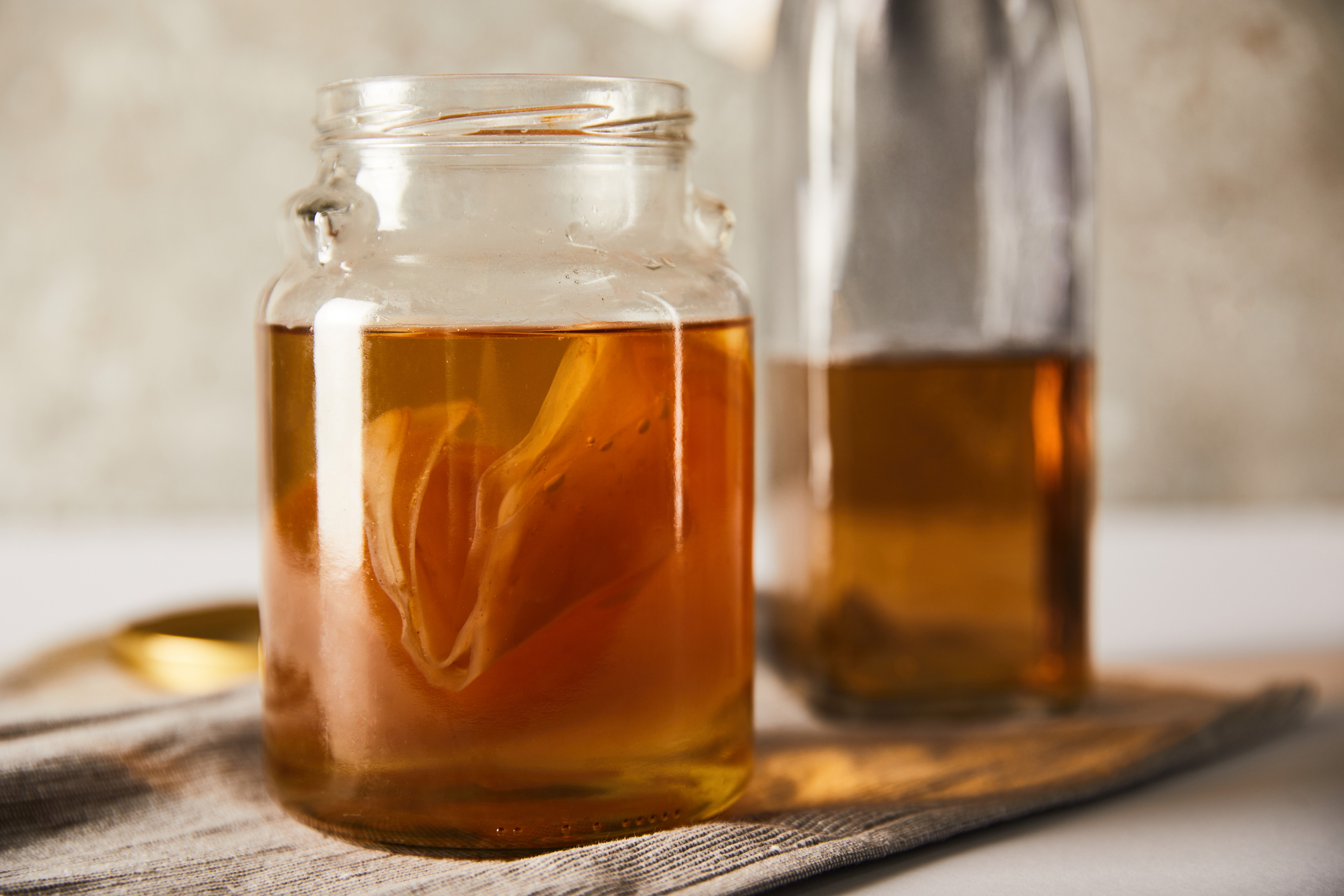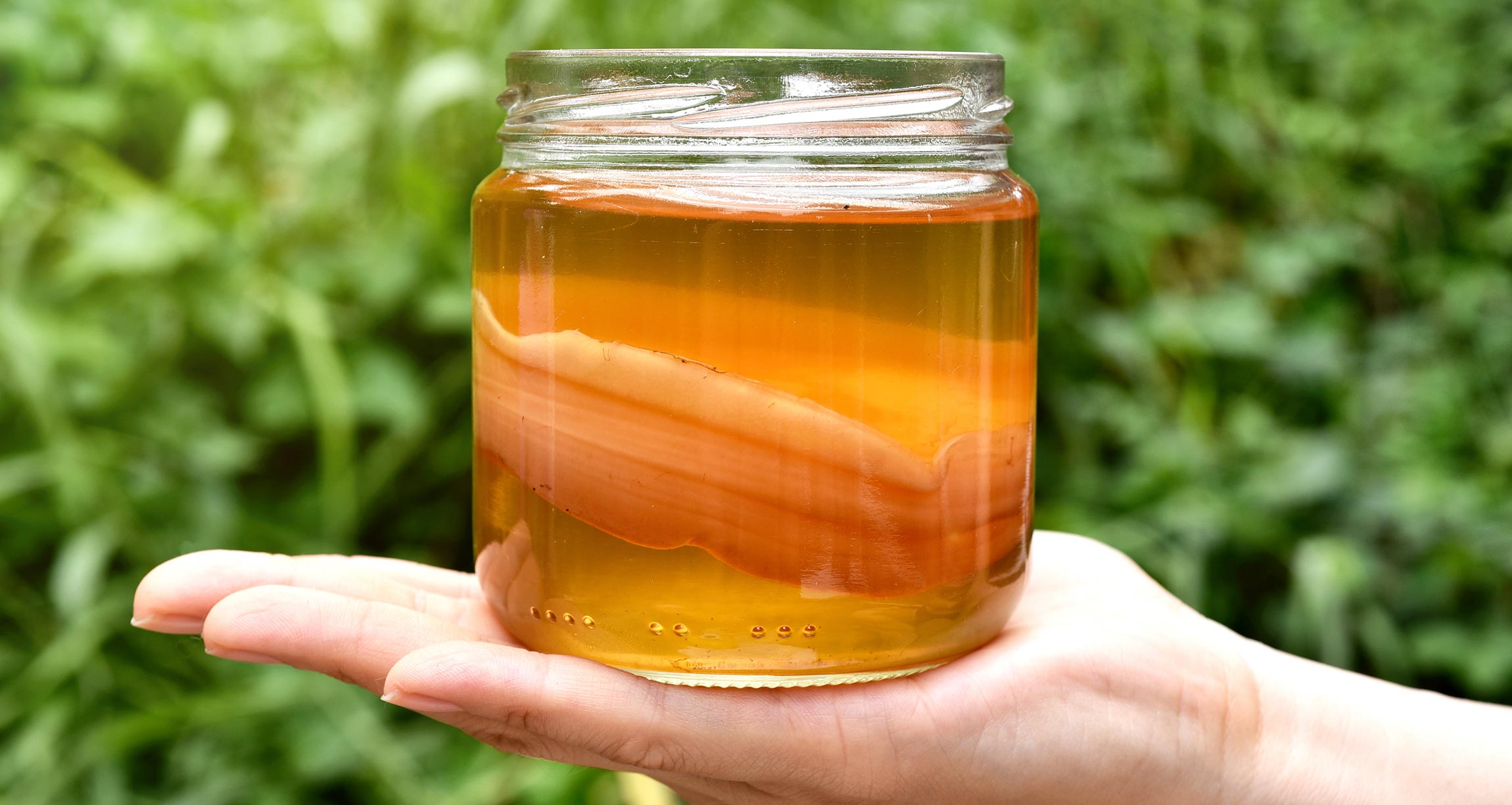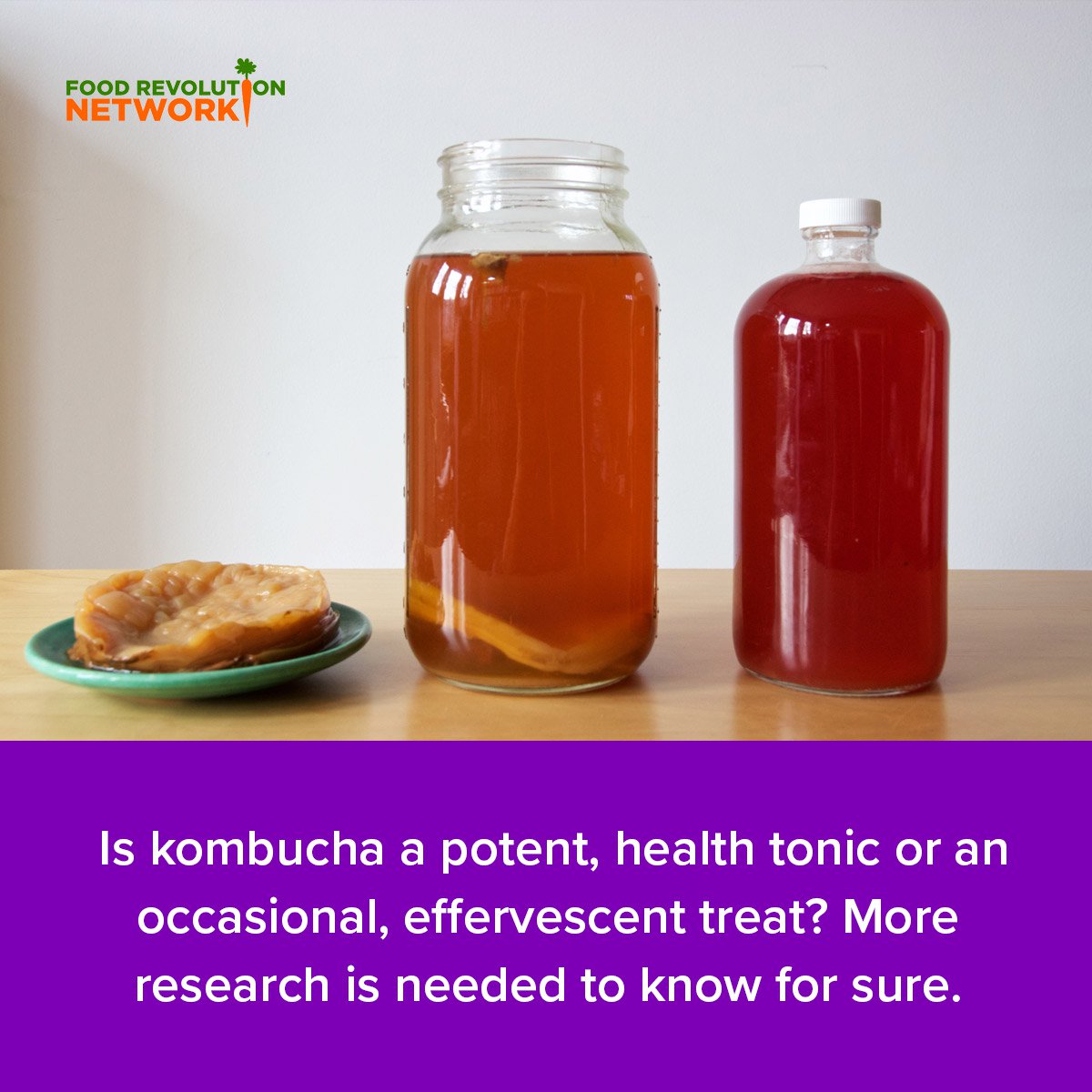Many people know kombucha tea for its health-promoting benefits. But is it actually good for you? Find out what we know (and don’t know) about the health effects of this popular fermented tea.
Once considered a relatively obscure health beverage, kombucha has gone mainstream.
Supermarkets and convenience stores around the world carry this type of tea. In 2017, sales reached more than $500 million in the U.S. alone. Food industry leaders predict global kombucha sales will be close to $2 billion by 2020.
Proponents have called it “the ultimate health drink” and the “tea of immortality.” Skeptics remain unconvinced. But what do we know?
Is kombucha a delicious and health-giving beverage? Or is it an overpriced and even potentially dangerous new spin on a soft drink?
What Is Kombucha Tea?
Kombucha is a sweetened, fermented tea.
The fermentation process creates, among other things, carbon dioxide (which gives the tea its fizz), alcohol. It also creates a variety of acids including acetic acid, lactic acid, propionic acid, glucuronic acid, and gluconic acid.
The taste of kombucha varies. But it typically has a slightly sweet, slightly sour, vinegary flavor and a light, effervescent feel. Some people say it resembles the taste of sparkling cider.
Flavored kombuchas are made by adding fruit purees or fruit juice concentrates, herbs, spices, and other ingredients.
How Is Kombucha Made?
Traditionally green, black, or white tea (which all come from the Camellia sinensis plant) is used to make kombucha. Most herbal teas don’t have the nutrients needed to make the process work.
A sweetener is then added — usually white sugar. Other sweeteners have been used, as well, such as honey, maple syrup, and Jerusalem artichoke tuber extract.
Then, the mixture of tea and sweetener ferments with the help of a symbiotic culture of bacteria and yeast (also known as a SCOBY, or a “mother”).
A SCOBY is a thick, round, floating microbial colony that resembles a mushroom. Even though kombucha is sometimes called “mushroom tea,” it doesn’t contain any mushrooms.
The SCOBY is a self-perpetuating culture. This means it multiplies itself through the process of creating kombucha tea. (New starter colonies are sometimes called “daughters” or “babies.”)
After a period of time — anywhere between three and 30 days — the kombucha is ready to drink.
What About the Alcohol Content of Kombucha?
During the fermentation process, the culture turns sugar into ethanol, which is a type of alcohol. So the resulting beverage contains alcohol.
But how much alcohol is actually in kombucha?
Compared to a standard alcoholic beverage like a 12-oz beer (5% alcohol) or a 5-oz glass of wine (12% alcohol), not much. Kombucha typically contains about 0.5 to (rarely) as much as 2% alcohol.
The bottled kombuchas you see in stores have to follow the U.S. government requirements for non-alcoholic beverages. This means unless their labels say, “21 and over,” they must contain less than 0.5% alcohol.
While the alcohol content is low, it can cause problems for some people, particularly recovering alcoholics. But for most people, it’s not much of an issue because it’s less than 1/10 the amount typically found in beer.
Are There Benefits to Drinking Kombucha?
Tea is a remarkably healthy beverage. Its proven benefits range from helping fight cancer and improving bone strength to burning fat and protecting against cardiovascular disease.
Kombucha comes from tea. So how does it stack up?
Studies on kombucha have found polyphenols, acids, and vitamins, which are in regular green and black tea. In fact, in one study, kombucha tea had more antioxidants than unfermented tea.
Polyphenols in tea have shown great potential in protecting against some types of cancer. The most potent benefit of tea — both fermented and unfermented — may be its catechin content. Catechins act as potent antioxidants and protect against the development of disease. And many of them are abundant in kombucha.
In addition to the beneficial components found in tea, new compounds form when you make kombucha, which may also have favorable effects. One compound is DSL (D-Saccharic acid-1,4-lactone). DSL has the potential to inhibit an important enzyme that may be linked to cancer growth. More study is needed to determine if this will also provide benefits to humans.
According to a 2008 study published in Food Chemistry, DSL is one of many new compounds created during the fermentation process.
So kombucha likely has many of the same stunning health benefits of drinking tea. And it may also have some additional benefits stemming from the DSL and other new compounds in kombucha that aren’t in unfermented tea.
What Does Science Say About the Health Claims of Kombucha, In Particular?
If you look at the research around kombucha and its benefits, one thing is clear: We need more research.
There are a lot of health claims made about kombucha, but there aren’t enough studies for us to know if they are true or not.
But so far, no studies have been published on the biological effects of kombucha on humans.
We have animal studies and some decently valid sounding theories. (I’m not a fan of animal studies because they are often cruel, but I think they can sometimes be useful.) But we lack scientific evidence to back up many of the health claims about kombucha. It seems plausible that it brings some positive health benefits. But so far, there are no published studies on the biological effects of kombucha on humans.
While we lack certainty, an impressive body of studies do suggest that kombucha tea could have antimicrobial, energizing, and detoxification effects. And it may even help prevent disease, including cancer, heart disease, and type 2 diabetes.
Study Results on Kombucha Tea
- Kombucha could potentially help prevent a broad range of diseases. A 2014 review of animal studies published in the Journal of Medicinal Food found that kombucha tea contains properties that could help prevent many diseases, particularly “broad-spectrum metabolic and infective disorders.” They concluded that it may be able to help with detoxification, antioxidation, and healthy immune function.
- Kombucha could slow or kill harmful microorganisms. A 2012 study published in the Journal of Food Chemistry reported that kombucha made from both black and green tea had antimicrobial potential. Researchers also found that the green fermented tea had the most antimicrobial potential. Other studies have shown that kombucha could kill bacteria that commonly cause food poisoning.
- Kombucha may have cancer-fighting power. A 2013 study published in Biomedicine & Preventive Nutrition showed that kombucha had remarkable potential to inhibit angiogenesis. (Angiogenesis is the process by which cancers lock in a steady supply of blood and become dangerous.)
- Kombucha may help protect the liver. A 2009 study on some very unfortunate rats published in the Journal of Microbiology and Biotechnology revealed that kombucha tea was effective in improving liver function and lowering the side effects of toxins.
- Kombucha may reduce heart disease risk. In other studies also done on rats, kombucha improved two markers of heart disease in as few as 30 days. A 2015 study published in Pharmaceutical Biology found that kombucha lowered “bad” LDL. It also led to higher levels of “good” HDL cholesterol.
- Kombucha may help manage diabetes. A 2012 study published in BMC Complementary and Alternative Medicine on diabetic rats found that kombucha slowed down the digestion of carbohydrates, reducing blood sugar levels. It also improved liver and kidney function.
- Kombucha is a rich source of probiotics. As a fermented food, kombucha carries a large number of probiotic bacteria that may be beneficial to your digestive health. A 2014 study published in Food Microbiology identified a prominent Lactobacillus population and numerous beneficial yeast species that were abundant in kombucha.
Kombucha Side Effects, Risks, and Concerns
So what are the potential downsides of kombucha?
Here are some things to consider:
Kombucha Contains a High Amount of Sugar
In a 2001 paper called Sucrose and Inulin Balance During Tea Fungus Fermentation, researchers found that almost 35% of the sugar remains after seven days of fermentation. After 21 days, this percentage dropped to 19%. This is why kombucha tastes sweet when you drink it — even though it’s fermented.
Also, some of the kombuchas on the market have fruit juice or sugar added after the fermentation process. This means those batches will have more sugar.
I’m sure you don’t need another lecture on the negative health effects of excess sugar consumption. But some of the kombuchas at my local health store contain 14 grams of sugar in a 16-oz bottle. That’s almost as much as you’ll find in a 6-oz can of coke!
So if you’re buying kombucha, I recommend reading the nutrition facts. And remember: If it tastes sweet, it’s probably because it is. Aim for the lower sugar options.
Negative Effects for Some People
No two kombuchas are exactly alike. The type of SCOBY used, length of fermentation, temperature, humidity, containers, and ingredients can lead to wildly different outcomes.
At this point, hundreds of millions of people have at least tasted kombucha. We know that obvious adverse reactions, at least in the short term, are rare. But there’s a lot we don’t know about it. Without any long-term studies on humans, it’s difficult to know with certainty if there could be any problems that might show up over the course of time.
We do know that drinking kombucha has led to adverse effects, including liver damage and even, in at least one case, death. Longer fermentation produces high levels of acids that may pose potential risks when consumed by vulnerable populations, such as people with compromised immune systems or those with HIV.
Some people have also reported experiencing nausea and dizziness, as well as allergic reactions and headaches.
Does this mean kombucha is dangerous for you? Not necessarily. It means that we don’t know with certainty because modern production methods (and scale) are relatively unprecedented. So as with many things in life, it’s important to listen to your own body and see what you notice.
And if you’re pregnant or lactating, you should probably steer clear of it altogether. A 2018 report published in the Journal of Primary Health Care recommends that pregnant and lactating women should avoid kombucha.
Should You Try Making Kombucha At Home?
Buying store-bought kombucha — at $3 to $5 per bottle — can quickly get very expensive. Making your own kombucha is cheaper. But you must do it right.
Commercially sold kombucha goes through a regulation process, but homebrewed kombucha doesn’t. If you don’t store it or make it properly, molds and fungi can easily contaminate homebrewed kombucha and cause illness.
And never brew kombucha in clay or ceramic containers possibly treated with lead. Studies have shown that lead can leach into the beverage.
If you plan to homebrew kombucha, use sterile equipment. This typically means stainless-steel (while metal is not an appropriate material to brew kombucha tea, stainless steel may be because it is non-corrosive) or glass containers, a clean area, and a healthy SCOBY without black spots or signs of mold. (You may be able to buy one at natural foods stores or online, or get one from a friend who makes kombucha.)
You can find other tips to help you create safe kombucha tea here.
My Take on Kombucha
Kombucha can be a fun and tasty drink. For many people, it’s more enjoyable than water. And it’s often a better choice than bottled juices and a much better choice than soda.
It’s made in part from one of the healthiest plants in the world — tea. Kombucha also brings a healthy dose of antioxidants plus some health-boosting probiotics.
But it also contains sugar, some of which remains in the final product. And the health impacts of kombucha on humans are uncertain because we don’t have published studies to guide us.
Personally, I drink it from time to time. I enjoy the bubbly effervescence, and the unique taste profiles of different flavors. But I know it’s pricey and that it contains sugar. So I don’t think of kombucha so much as being a “health beverage,” as being a potentially beneficial treat.
And other beverages have been more thoroughly studied. For our article on five of the healthiest beverages in the world, click here.
Note: Subsequent to the publication of this article, it came to our attention that some dentists have correlated a rise in dental problems with the rise in kombucha consumption. It turns out that kombucha is highly acidic, and that as such, it can damage your teeth in much the same way that soft drinks do. For more on this concern, click here.
The article recommends, “rinsing your mouth with water after drinking kombucha to wash away the acidic compounds it may leave behind and not eating or brushing for at least 30 minutes afterwards.”
Tell us in the comments below:
-
Do you drink kombucha? Why or why not?
-
What are your experiences with drinking and making kombucha tea?
Featured Image: iStock.com/KATYENKA
